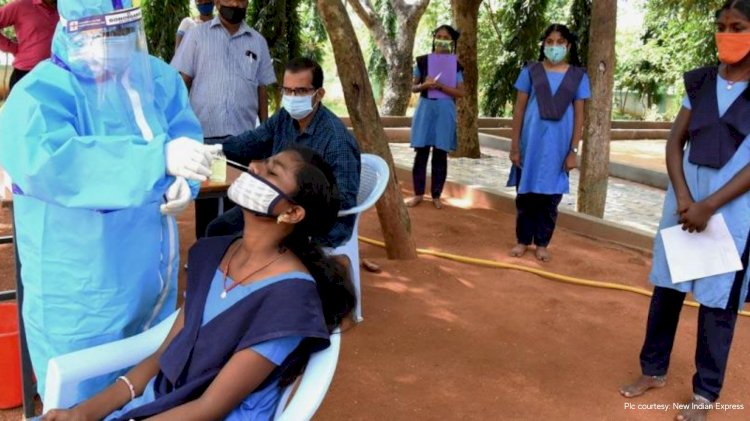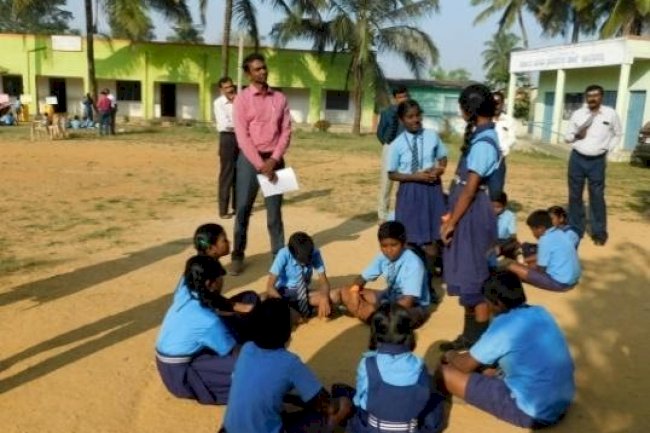Should the board examination for tenth standard students be conducted in 2021 amidst the COVID pandemic?

The effect of COVID on various sectors and systems has been enormous and incomprehensible. Challenges that children within the education system are going through are multifaceted, affecting their growth and development. The entire year witnessed arguments against and in favour of conducting schools. In the meantime, different means of imparting education were also being explored and experimented as an alternative. And now we are witnessing another debate on conducting examinations. While not much debate is happening for passing children up to ninth standard, it is shaping up as a heated one for tenth standard examination for all the board exam pressure it comes packed with. In a way the first and a key milestone in the educational journey of a child.
Conducting examination was discussed, debated and demonstrated in the year that passed amidst the first wave of COVID pandemic. The Karnataka Government boldly took a committed decision to conduct the examination, while most state boards including the central board were hesitant and apprehensive. The Karnataka State Education Department demonstrated a cohesive and coordinated effort in conducting the exams successfully and safely.
Considering the present scenario, with a surge in the second wave of pandemic across the country, an opinion about conducting the board exams for tenth standard is being sought this time from the concerned stakeholders, including the students, teachers, parents, and people having a concern about learning of children. GRAAM conducted this survey to understand the opinion of the stakeholders. While this opinion poll was being initiated, the CBSE board took a decision to call off the examination.
A simple and structured online questionnaire was developed and disseminated using various social media platforms. The opinion was collected through a three-day state-wide survey in which 1487 respondents participated. Out of 1487 respondents, 737 were from the rural and the remaining 750 were from the urban areas. The survey elicited responses from the primary stakeholders, with 606 students and 254 teachers participating alongside 278 general respondents.
Yes, examination should be conducted
It is interesting to note that 78 percent of the teachers, 60 percent of the students and 60 percent parents and 65 percent of the general public who participated in the survey are in favour of conducting the examination at this juncture. In total, 64 percent of the respondents are in favour whereas 36 percent are not in favour of conducting examination at this juncture.
Segregated analysis of rural and urban respondents’ opinion infers that 71 percent of them from the rural areas are in favour of conducting examination, whereas only 57 percent of respondents from the urban area are in favour of examination in these times.
Children should not be retained in the same class for another year
The normal course of action whenever an examination is not conducted is to either retain the children in the same class with the intention of making them learn better or to promote them to the next class without the need to conduct an examination. In total, 80 percent of the respondents want the children to be promoted to the next class with or without the examination. Teachers are more in favour of promoting them to the next class (91 percent). It is also interesting to note that 23 percent of the students feel they should continue in the same class, while the majority of them opine the other way. A similarity in response was visible across the opinions recorded from the rural and urban respondents.
No, children cannot be promoted on the basis of internal assessment marks
One of the options to consider for promoting children to the next class without conducting examination is on the basis of internal assessment marks. But, little more than half, i.e. 51 percent of the respondents opined that the children should not be promoted on the basis of internal assessment marks without conducting examination. Interestingly, 68 percent of students expressed their consent to getting promoted to the next class based on internal assessment marks. Respondents from the rural area are mostly (53 percent) not in favour of the idea of promoting children based on the internal assessment marks compared to respondents from the urban area (47 percent).
‘NO’ to conducting examination online
Online has become an inevitable option of communication now. Likewise, it has also emerged as an option to conduct examinations. 64 percent of the students, 71 percent of the parents, 86 percent of the teachers and 64 percent general public opposed the idea of online examination. In total, 70 percent of the respondents are not in favour of online examination for tenth standard students.
Expectedly, more respondents from the rural areas (77 percent) are not in favour of online exams compared to the urban respondents (63 percent). This result particularly highlights against the assumption that urban respondents are normally in favour of online examination. More than anybody, it is the teachers who are most against the online examination (86 percent), and rural teachers outnumber (90 percent) urban teachers (82 percent) in this opinion.
Students will face difficulties in choosing their next course of education
Normally, the results of tenth standard exams a decisive factor in choosing the next discipline of study. The scores children get in Mathematics, Science and English will be considered as a metric for availing admission in science and technical disciplines. Students also get to understand their competence or interest in the subjects or discipline based on the marks they score in the respective subjects. 69 percent respondents opined that without examination, students will face difficulty in choosing their next course of education To break the response further down, 68 percent of students, 64 percent of the parents, 71 percent teachers, and 63 percent general public opine that students will face difficulty in choosing the future course of education without examination.
Suggestions
It is evident from this opinion survey that most respondents are in favour of conducting the examination with due precautions. They are not in favour of retaining the children in the same class. Also, not in favour of passing them just by considering the internal assessment marks.
Stakeholders also shared an opinion that examination is important from the point of choosing the next course of education, while online examination is not a preferred option. Based on the findings, we make the following suggestions for the consideration of the appropriate
authorities while deciding on conducting the examination. In addition to this survey, a larger opinion poll, sometime in the middle or end of May 2021, based on how the situation will transpire along the surging curve.
- Examination Centers may be increased at more clusters that are most accessible and connected with adequate public transportation facilities. SSLC Exam Express – a special transport facility using KSRTC buses should be made available.
- If possible, exams should be conducted at every school so that more children assembling at one center can be avoided.
- Masks (preferably local SHG stitched) should be kept in stock and distributed to the students and teachers.
- Social distancing should be strictly adhered to and liquid handwash / sanitizers should be made sufficiently available.
- The Panchayat/Municipality should take special care to sanitize the school premises every day before the examination.
- If possible, a suggestion of conducting TWO exams per day with the provision of mid-day meals can be considered, so that the number of trips to school for the sake of examination could be reduced.
- Midday meal facility should be extended to the accompanying parents and other line department officials deployed for examination duty.
- The Head Teachers from other cluster High Schools may be made as the Superintendent of the Examination Centers, wherever the centers are considered as sensitive (previous history of malpractice etc).
- Health Personnel should be deployed to ensure health, hygiene and social distancing and appropriate implementation of the same.
- Ensure use of hand sanitizers and gloves at every level of paper handling, including distribution, collection, bundling and storing/dispatching.
- Evaluation of answer papers can be done at the cluster or block level to ease the transportation and storing of papers and also to expedite the process.
- A helpline number could be set up (District Centered), to assist children with information about examination, preparation, structure of questions papers, overcoming fear of examination amid COVID pandemic. Exam Warrior book (transacted through Makkala Vani YouTube Channel) may be used to facilitate children to write examinations confidently.
Need and importance of conducting examination
- Most importantly, children should be encouraged to ‘earn’ and not to ‘expect gratis’ anything in their life. They should not get habituated to exemptions. It may be COVID this time, it can be another natural or man-made calamity tomorrow.
- In a school, a wide variety of subjects are taught because every individual must get a fair chance to learn and then decide their most preferred field. The exams are there to help the child to appreciate how he/she is faring in comparison to his/her inclination and potential.
In a way, exams help children to assess their interest and inclination, and choose the subjects they want to study further exclusively. - Exam augments the confidence level of the children.
- It promotes a spirit of competition among the students, focusing on improving their cognitive skills.
- Absence of examination may hamper parent’s aspirations and students’ dreams. If all the students are considered ‘just pass’ or given a ‘common rank’, it shall bear consequences on their future education and job opportunities. The importance of tenth standard exams in the long run and its consequences should be kept in mind in making this important decision.
What's Your Reaction?




















